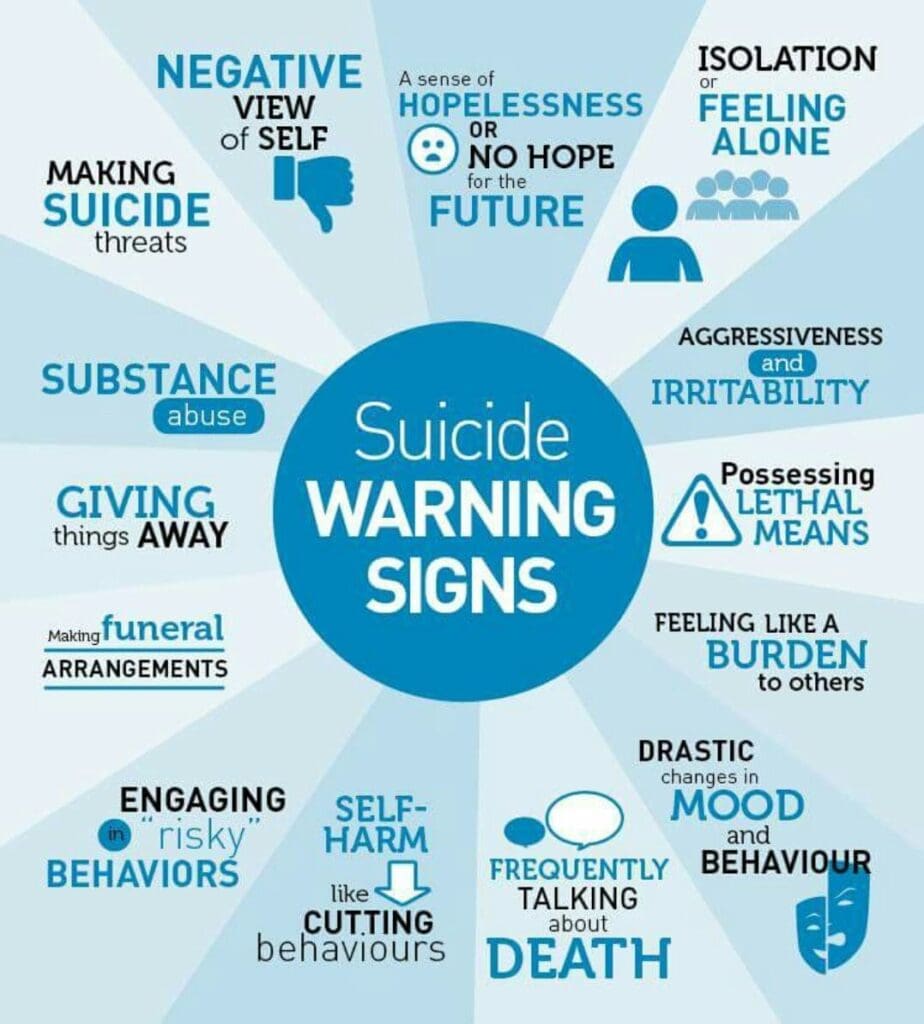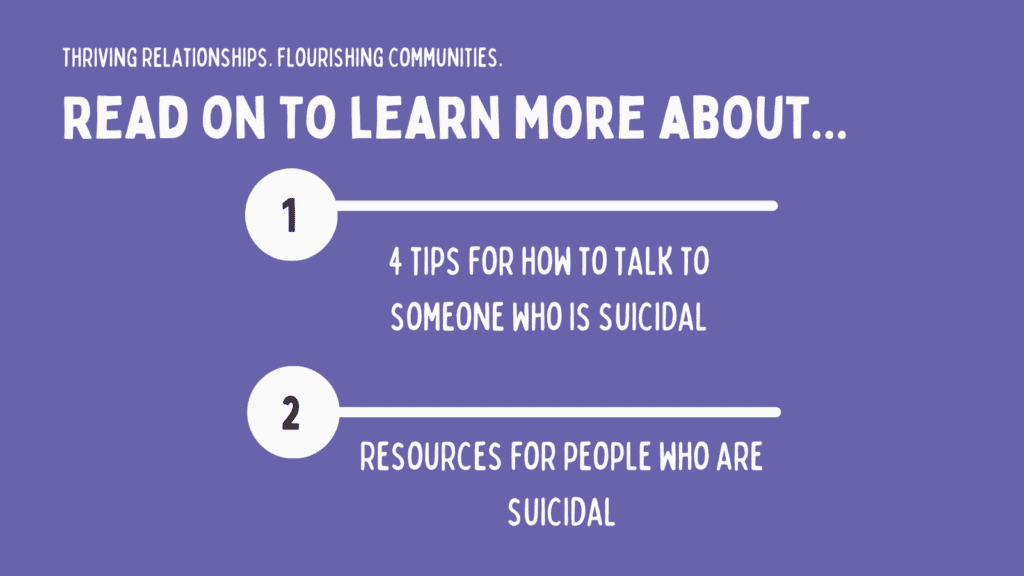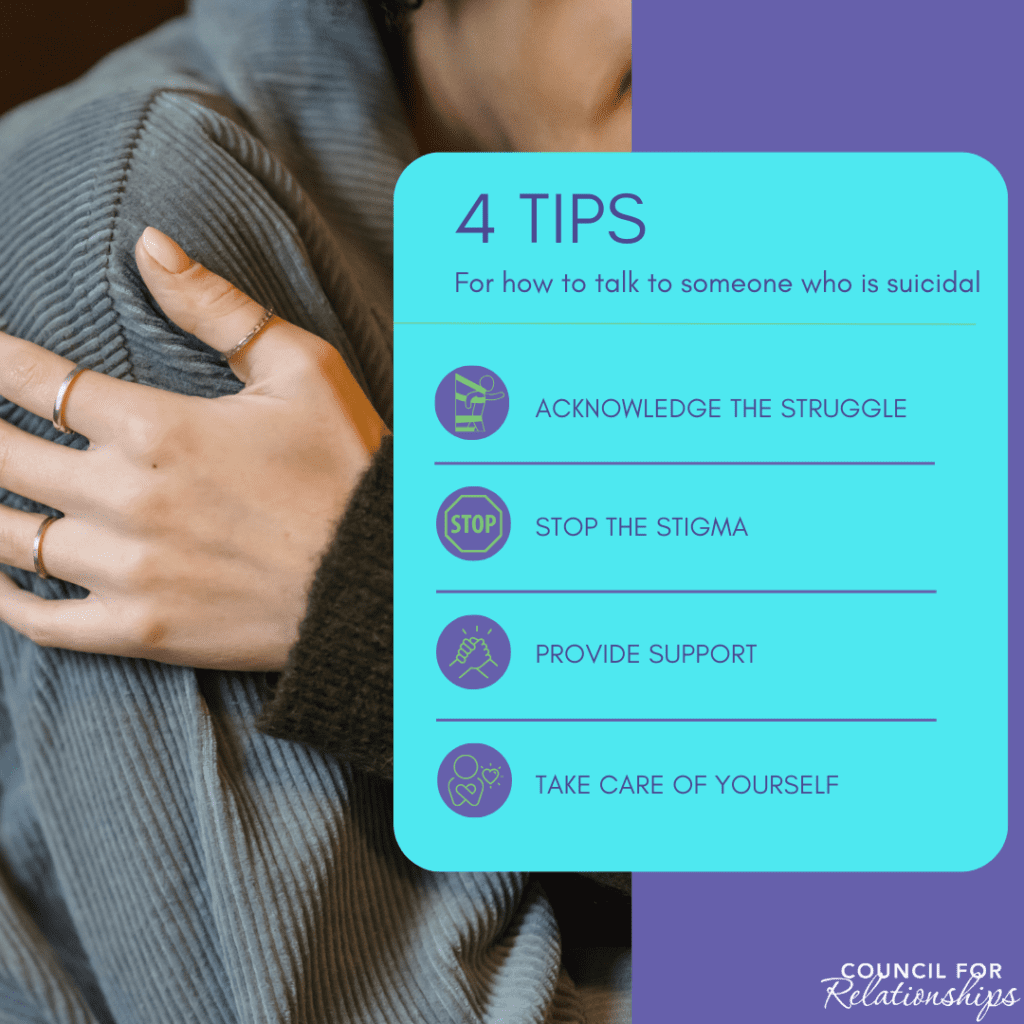How to Talk to Someone Who is Suicidal
I recently attended the New Jersey Suicide Prevention Conference. This topic is never easy to discuss or listen to, but it is crucial. New Jersey has lower suicide rates compared to other states, but suicide rates are increasing across the country. The biggest takeaway from the conference is that the best way to prevent suicide is to discuss suicide.
As we enter the Holiday season, this may be an opportunity to speak to someone you care for about their mental health. Here are four tips for how to talk to someone who is suicidal.
Four tips for how to talk to someone who is suicidal
1. Acknowledge the struggle
People who feel suicidal or depressed often feel isolated. They feel like they are burdening the people they value, so they hide their feelings.
If you notice your loved one is having difficulty, talk to them about it. Saying something like, “I noticed that you seem more distant lately” or “I’m worried about you.” Asking “What’s happening?” can start a discussion about their emotions or show that you value them.
If they are not ready to engage, do not give up. Check in on them again.
2. Stop the stigma
Some people who have attempted suicide or have suicidal thoughts feel too ashamed to confide in anyone. They are embarrassed to share their struggles with others. We should change the perception that suicide is for weak and selfish individuals. Instead, we should view it as someone who is experiencing pain and requires assistance and support.
Validating medication and therapy for mental health helps reduce the stigma surrounding mental health struggles.
3. Provide support
This can look like many different things and is unique to your relationship. Some people feel cared for when you regularly call or text them. Others feel cared for when you give gifts, make them a meal, or offer to help with tasks. If you are unsure what you can do to provide support, try asking your loved one to see what they enjoy best.
If your loved one shares that they have suicidal thoughts, you need to take the following actions:
- Do not panic. Instead, thank them for sharing with you. This must mean they trust you to tell you something deep and painful.
- Do not ignore it. Instead, you can support them by encouraging them to seek help. They can contact a suicide hotline, such as the National Suicide Prevention Hotline 988. Another option is to suggest they speak with a therapist. If they are in immediate danger, they may need to go to the emergency room.
4. Take care of yourself
Caring for someone who struggles with suicidal ideation or depression can sometimes feel overwhelming and exhausting.
You don’t have to become their therapist, and you don’t have to handle every problem they face. Establishing clear boundaries for your well-being and supporting your loved one is vital. Many resources exist to support people who are suicidal. Utilize them.

Infographic courtesy of the Colorado National Guard.
Resources for people who are suicidal
The following are resources if you or someone you know is struggling with mental health or feeling suicidal:
National Suicide Prevention Lifeline
National Suicide Prevention Lifeline provides 24/7 assistance for individuals in distress. It offers free and confidential support and resources for preventing and managing crises. Additionally, they also guide professionals. Call or text 988.
The Trevor Project
The Trevor Project’s trained counselors support LGBTQ+ young people 24/7. If you are a young person in crisis or feeling suicidal, you can call the Trevor Lifeline at 1-866-488-7386. This helpline provides a safe and non-judgmental space for you to talk.
New Jersey-specific resources for youth and families
If you are between 10 and 24, live in New Jersey, and need to discuss an issue or problem, the 2nd Floor Youth Helpline is here for you. Call 888-222-2228 anytime or text them at 888-222-2228.
Mobile Response and Stabilization Services are available 24 hours a day, seven days a week, to help children and youth and assist them in emotional or behavioral crises. The services assist in resolving crises. They also ensure the safety of children and families.
Moreover, they enable children to remain in their homes or living situations. These situations may include foster homes or group homes within the community. To access their services, call 1-877- 652-7624.
About the Author
Danielle Silverman, LCSW, MEd, is a Staff Therapist at Council for Relationships. If you have questions about how to talk to someone who is suicidal or would like to schedule an appointment with her, you may reach her here.
If you are looking for individual, couple, or family therapy or psychiatry, click here to request an appointment. See our Therapist & Psychiatrist Directory for additional CFR therapists or psychiatrists near you.



